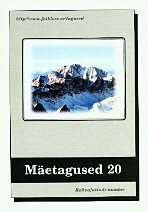Mõned teesid hüvastijätuks mõistega ajalooline muistend
Some theses in memoriam to the term historical legend
Author(s): Klaus GrafSubject(s): Customs / Folklore
Published by: Eesti Kirjandusmuuseum
Summary/Abstract: This treatise is dedicated to the term of historical legend as part of the scientific classification. In the future, this term should only be used in the context of research history in connection with narratives that have been called thus since the beginning of the 19th century. As a replacement, the term historical heritage is offered. Narrative research needs to conclude the research into historical heritage initiated by historians. It is just as important that historians would recognise the achievements of narrative researchers. It is either trivial or dangerous to speak of the historical core of heritage: dangerous in case this is intended to prove the validity or source value of oral heritage or to support a speculation based on lacking source material. The term folk vision of history is unsuitable as the terms nation and history are not sufficiently unambiguous. The term historical thinking is a fickle group-specific summary of different kinds of (in Ludwig Wittgenstein's terms, kindred) language usage. Historical heritage needs to be viewed as an inseparable part of its contemporary culture, i.e. first of all together with its group-specific historical development, but also the non-verbal, material media. Not all heritage that included widespread narrative motifs has been among widespread heritage. Not all heritage in the form of folk legend was generally, i.e. also among the lower and middle class, known. Legends from the 19th and 20th centuries must be taken seriously, but first of all as literary phenomenon. Their (except in the case of obvious fakes) philological classification is primary to finding in them the narratives that were transmitted orally or archaic heritage. Heritage becomes relevant for research by the crossing points of discourses characteristic to a era as expressed in versions of a single heritage narration, not as the core essence of heritage maintained in all contexts. Translation based on the German article Thesen zur Verabschiedung des Begriffs der `historischen Sage' published in Fabula 29 (1988), pp 21-47. Translated by Reet Hiiemäe.
Journal: Mäetagused. Hüperajakiri
- Issue Year: 2003
- Issue No: 20
- Page Range: 7-43
- Page Count: 37
- Language: Estonian

